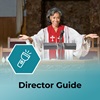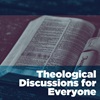Many have suggested that 12 members is the the optimum size for a small group to maximize its interaction and build community. After all, Jesus chose 12 followers initially, most literature in the past 14 years has advocated 12 as the preferred size, and observation has shown that balanced participation among members declines when a group gets significantly larger than 12.
My favorite response to a leader bragging that their group now is so successful that it has 18 or 20 members is, "Then, you don't lead a small group any more." One distinctive of small groups is discovery learning and sharing of biblical insights. The value is that we can all grapple with the Word, draw personal conclusions, and share those with others.
On the other hand, Josh McDowell, among others, suggests that as the Church moves increasingly toward a small group dynamic as its modus operandi, it also tends to diminish the quality and/or intensity of teaching ministry. The net result can be that truth becomes relative. In other words, when truth becomes essentially what I think the Bible means, or what it says to me, the long term impact is to conclude truth is little more that what one thinks it is.
The point is well taken. Particularly if newer Christians hear a steady diet of views, opinions, and personal "takes" on the Scripture, the indepth study and "thus says the Lord" may eventually be lost from Christian experience. The danger is that belief may become little more than an existential conclusion.
While we must always be open to a variety of views and patient with those who do not understand, many biblical concepts and principles have been constants throughout Christian history. There is such a thing as moral absolutes. There really are!
There is a second, more practical issue with which pastors and church leaders have wrestled. It is the question of whether to stress small groups or the Sunday school. For many churches, this has produced confusion, frustration, and even disunity. At the same time, in some cases church leaders have chosen to look the other way when they have seen subjectivity dominate church life. In other fellowships, they did not see, or worse, would not admit that the trend toward subjectivity may be ultimately harmful even though they have seen these dangers.
Fourteen years ago, when I began serving as Small Groups Pastor, the largest bookstores in Nashville had a huge section of books on Sunday school and a section nearly as large with small group materials. And between them was a wide isle. That isle always appeared to me to be emblematic of the tension between biblical teaching and discovery learning with community building.
Both the questions of group size and tension between teaching and sharing, to put it simply, have caused an increasing number of churches to consider merging their small groups within Sunday school classes or ABF's. This model, championed by Dan Southerland and Mike Shepherd of Flamingo Road Church in Ft. Lauderdale, Florida, brings the best of small group dynamic into the teaching/learning environment, and has done so with great success.
However, for hundreds of churches that has not always worked. This has been true for a number of reasons: For one, not all teachers make good discussion leaders. For another, many dedicated Christians are not flexible enough to adapt to the more informal, casual structure of this merger model. And, there are still the limitations for most churches of size and time during the ABF or Sunday school hour.
When I first assumed the small group ministry in a church of 1,100 attendees as a staff member, I soon discovered that this more traditional church was deeply committed to Sunday school. It would have been foolhardy for me to create a ministry that appeared to compete with the Sunday school that averaged over 850 in attendance.
Instead, we married the two. Every small group, we call CareRings, links with an adult Sunday school class. I have discovered no less than a half dozen values in doing so. Here are most of them:
First, classes build groups and groups build classes when they are linked. Some people feel more comfortable going to an informal home meeting before they commit to a class, and others are more comfortable in the larger class than the intimate setting of a group. They join one, and get interested in the other.
Second, in larger churches, and even middle sized churches with two sessions, shepherd-leaders can make contact with their members if the members attend their class. Otherwise they might never even see them.
Third, when starting new groups, we have a built in "pool" in which to "fish" for new members if they are developed out of a class.
Fourth, new class members can quickly and effortlessly be assimilated into the lives of a class when invited to a group.
Finally, linking groups and classes provides a built in care system for all adult classes! This is a powerful value that has helped keep many of our classes strong.
Even more importantly, BOTH our Adult Sunday school AND our CareRings small groups are growing. And, there is balance between the instruction of Sunday school and doing life deeply in small groups. That's the best of both worlds.
As far as size is concerned, we have both: Larger classes and smaller groups.
If you are interested in knowing more, read CareRings—Sunday School and Small Groups Side by Side.









